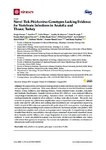Novel Tick Phlebovirus Genotypes Lacking Evidence for Vertebrate Infections in Anatolia and Thrace, Turkey
Emanet, Nergis
Kar, Sırrı
Dinçer, Ender
Brinkmann, Annika
Hacıoğlu, Sabri
Aligholipour Farzani, Touraj
Koçak Tufan, Zeliha
Fatoş Polat, Pelin
Şahan, Adem
Özkul, Aykut
Nitsche, Andreas
Linton, Yvonne-Marie
Ergünay, Koray
We screened ticks and human clinical specimens to detect and characterize tick phleboviruses and pathogenicity in vertebrates. Ticks were collected at locations in Istanbul (Northwest Anatolia, Thrace), Edirne, Kırklareli, and Tekirdağ (Thrace), Mersin (Mediterranean Anatolia), Adiyaman and Şanlıurfa (Southeastern Anatolia) provinces from 2013–2018 and were analyzed following morphological identification and pooling. Specimens from individuals with febrile disease or meningoencephalitic symptoms of an unknown etiology were also evaluated. The pools were screened via generic tick phlebovirus amplification assays and products were sequenced. Selected pools were used for cell culture and suckling mice inoculations and next generation sequencing (NGS). A total of 7492 ticks were screened in 609 pools where 4.2% were positive. A phylogenetic sequence clustering according to tick species was observed. No human samples were positive. NGS provided near-complete viral replicase coding sequences in three pools. A comprehensive analysis revealed three distinct, monophyletic virus genotypes, comprised of previously-described viruses from Anatolia and the Balkans, with unique fingerprints in conserved amino acid motifs in viral replicase. A novel tick phlebovirus group was discovered circulating in the Balkans and Turkey, with at least three genotypes or species. No evidence for replication in vertebrates or infections in clinical cases could be demonstrated.
Files in this item

